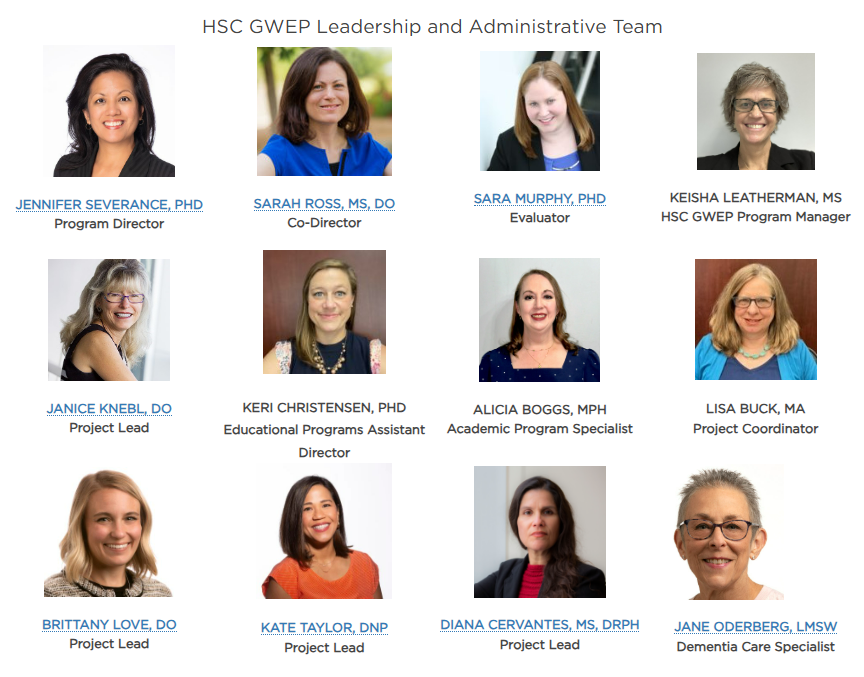
Welcome to UNT Health Center for Older Adults Geriatrics Education Hub ...
a connection to online courses, self-study modules, and other resources designed to increase proficiency in caring for older adults across disciplines and career stages.
Check out this NEW MODULE: Addressing Depression in the Context of Age-Friendly Care
Continuing Education On Demand
Addressing Depression in the Context of Age-Friendly Care
This activity will discuss suicidal epidemiology, assessment, and treatment for Major Depressive Disorder. Although we see a much higher focus on suicide in younger people in the lay media, men aged 65 and older constitute the highest rate per 100,000 population.
Advance Care Planning
Provides detailed tips and instructions for having end-of-life care conversations, completing advance care planning documents, and important coding/billing information. The module highlights the importance of providing Advance Care Planning in the context of the 4M Age-Friendly Care framework.
Advocating for Independence Part 1 - Assessing Capacity, Mistreatment, and Social Determinants of Health
In this module, we will explore how healthcare team members can advocate for their older adult patients to ensure they can live in the least restrictive environment, safely maintain their independence to the degree possible, and enjoy life to the fullest. Part 1 focuses on assessing decision-making capacity.
Advocating for Independence Part 2 - Assessing Capacity, Mistreatment, and Social Determinants of Health
In this module, we will examine the primary types of mistreatment experienced by older adults and the impact of social determinants of health on risk factors and outcomes.
Age-Friendly Healthcare for Older Incarcerated Individuals
Equips healthcare professionals, correctional staff, and other key stakeholders with the knowledge and practical tools necessary to address the unique and often overlooked needs of incarcerated older adult patients.
Comprehensive Management of Osteoporosis in Primary Care
Develop personalized strategies to improve bone health for older adults, taking an interprofessional approach to osteoporosis prevention and management.
High-Risk Medications in the Elderly
Address the characteristics of high-risk medications and how to mitigate those risks for older adult patients.
Home-based Primary Care
This module will provide a framework for delivering home-based primary care, including benefits, safety assessment, eligibility, and Medicare regulations for home visits and home health.
Leading Change in Age-Friendly Health Systems
You'll explore the importance of age-friendly care, gain practical strategies to enhance patient outcomes, and learn how to implement meaningful change, even amid workforce challenges.
Promoting Medicare Annual Wellness Visits
This module explains the clinical benefits and documentation requirements of the Medicare Annual Wellness Visit (MAW). You will also explore the financial benefits for clinical practices that provide MAW to a high portion of their eligible patients.
SPIKES - A Six-step Protocol for Delivering Bad News
The SPIKES communication framework will help determine a patient's values, participation level in decision-making, and provide a plan to address the emotions and reactions when bad news is conveyed.
Creating Age-Friendly Health Systems
The module is currently being revised to include the most up-to-date information. Check back in January 2026.
Supporting Persons Living with Dementia and Their Caregivers
The module is currently being revised to include the most up-to-date information. Check back in March 2026.
Community Health Worker Training - Live and On Demand
Aging Well Together: CHW Training for Age-Friendly & Dementia-Friendly Care
This activity will prepare community health workers to connect older adults and their caregivers to essential resources needed to support their care, specifically in the area of mental health. This is especially important in rural, underserved, and tribal communities.
Older Adult Care for CHWs
This activity will prepare community health workers to connect older adults and their caregivers to essential resources needed to support their care across a broad range of dimensions.
This program can also be delivered in person for groups. Please contact Dr. Teresa Wagner at [email protected] if interested.
Live Virtual Continuing Education
Geriatric ECHO
The goal of this series is to train primary care resident physicians and healthcare professionals to confidently assess and act on the 4M's of Age-Friendly care (Matters Most, Mentation, Mobility, Medication), thus improving care for older adults in their community. The Geriatric ECHO welcomes all primary care professionals and is especially focused on reaching healthcare professionals serving rural and tribal primary care sites. Please email Alicia Boggs if you would like to get more information or have technical issues registering.
Series Options - Click the link to view specific topics and register for the sessions.
- 60-minute sessions held from 12:00 - 1:00 pm on the 1st Thursday of each month
- 60-minute sessions held from 12:00 - 1:00 pm on the 2nd Wednesday
- 30-minute sessions held from 12:30-1:00 pm on the 4th Tuesday
Series Objectives
Upon completion of this activity, learners should be able to:
- Transform clinical training by integrating age-friendly and dementia-friendly approaches.
- Impact practice in TTOUR (Tribal, tribal organizations, underserved and/or rural) primary care settings through interprofessional geriatrics clinical training and education.
- Provide workforce education and training in TTOUR primary care settings to improve care for older adults including persons living with dementia.
Target Audience -
This activity is intended for physicians and nurses.
Additional Training from Community Partners
How to Use POLST in Texas
Texas Talks developed this training to grow the use of POLST and education about its benefits in Texas. The online enduring activity will address overcoming barriers regarding the legal status of orders, practical usage as a best practice, and comfort in using and having conversations about POLST. The activity will provide a safe opportunity to practice the knowledge and skills.
Nursing Home Specific Modules
Enhanced Barrier Precautions in Nursing Homes
ICARE - Enhanced Barrier Precautions for Long-Term Care Ombudsmen - this module is specific to the role of long-term care ombudsmen.
ICARE - Enhanced Barrier Precautions - this module is appropriate for all concerned individuals.
Assessing Nursing Home Residents
Three-Minute Assessment in Nursing Home Residents - This ten-minute online course is designed for nursing home nurse providers, focusing on conducting a rapid, three-minute system-specific assessment of residents, emphasizing the clinical significance of each system being evaluated.
Vital Signs Training for CNAs - This ten-minute online course is designed for certified nursing assistants working in nursing home settings to enhance their skills in monitoring vital signs.
Nursing Care for Those Living with Dementia
Providing Nursing Care for Those Living with Dementia - This activity is a series of "mini-modules": Promotion and Support of Activity and Safe Mobility, Creating Meaningful Activities for Residents, Nonpharmacological Approaches to Behavioral Management, Dementia and Behavioral Health Medications, and Promotion of Oral Hygiene. Each topic takes about 15 minutes to complete and you can go in and out of the activity saving your progress.
James L. West Center for Dementia Care - Dementia Specialist Training
The James L. West Center partnered with HSC to create a dementia training course for the direct care workforce. Eventually comprising eight modules, the course meets the State of Texas training requirements for nursing home and assisted living staff and confers CE credit to other health care professionals.
Understanding Alzheimer's Disease and Related Dementias
This module explains the differences in symptoms and characteristics for Alzheimer's Disease, vascular dementia, Lewy Body Dementia, Frontotemporal Dementia, Mixed Dementia, and Mild Cognitive Impairment. It also covers best practices in care to manage dementia symptoms.
What to Expect & Person-Centered Approaches at Each Stage of Dementia
What to Expect & Person-Centered Approaches at Each Stage describes common characteristics and changes occurring at each stage of dementia as well as person-centered approaches that focus on quality of life.
About Us
As part of the national network of Geriatric Workforce Enhancement Programs funded by the Health Resources and Services Administration, we offer FREE training for primary care, nursing home, direct care, and supportive care workforces to improve age-friendly and dementia-friendly care for older adults.



 Facebook
Facebook X
X LinkedIn
LinkedIn Forward
Forward